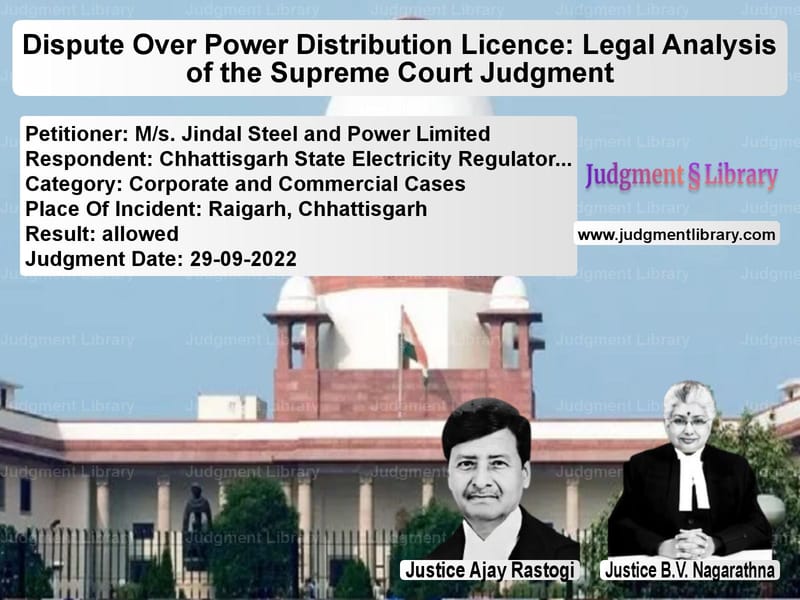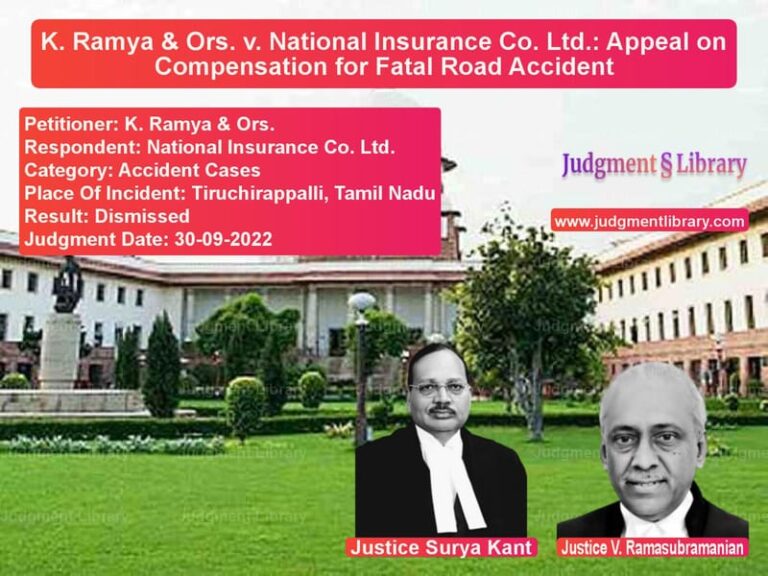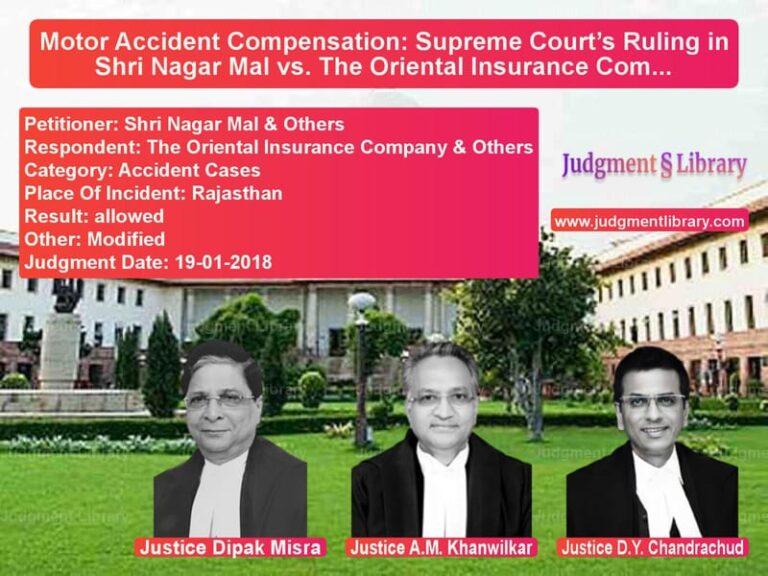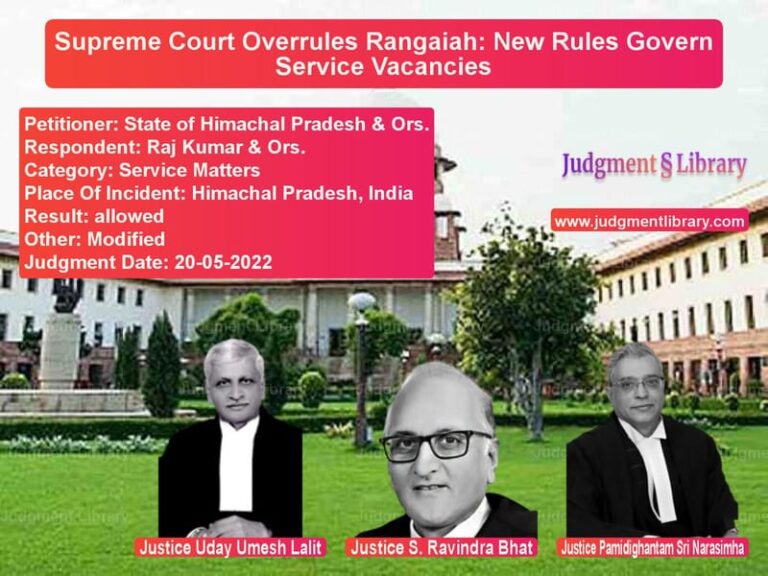Dispute Over Power Distribution Licence: Legal Analysis of the Supreme Court Judgment
The case involves a legal dispute concerning the distribution of electricity by Jindal Steel and Power Ltd. (JSPL) in the Jindal Industrial Park, located in Raigarh, Chhattisgarh. JSPL had applied for a distribution licence to supply electricity to industrial units within the park, as well as the surrounding villages, after having established a captive power plant. However, the distribution licence granted by the Chhattisgarh State Electricity Regulatory Commission (CSEB) was later set aside by the Appellate Tribunal for Electricity, which led to this appeal before the Supreme Court.
The dispute arose due to the interpretation of the applicable provisions under the Electricity Act, 2003, and the associated rules and regulations. The Appellate Tribunal had annulled the distribution licence granted to JSPL, which was subsequently challenged in the Supreme Court by JSPL, arguing that the order was unjust and not in line with the provisions of the Act. The case also saw participation from various other entities, including the Chhattisgarh State Electricity Board (CSEB) and the Chhattisgarh State Power Distribution Company.
Background of the Dispute
JSPL, which had established its sponge iron and steel plant in Raigarh in 1990, also set up a captive power plant to meet the energy requirements of its plant. Later, in 2001, the Chhattisgarh state government formulated its industrial policy encouraging the establishment of industrial estates, which included provisions for setting up captive power plants. JSPL took advantage of this policy and submitted a proposal for a private industrial estate with an integrated power supply system. This proposal, when accepted, was followed by a series of applications, correspondence, and permissions from the state government to supply electricity to these industrial units from its captive power plant. JSPL also entered into a Memorandum of Understanding (MoU) with the state government for the same purpose.
The dispute concerning the licence began when JSPL applied for a distribution licence in 2004, which the CSEB returned for filing in the prescribed format. The application was later filed again in 2005 and accepted by the Commission, though it was met with objections from other stakeholders. The objections primarily related to the legality of granting the distribution licence under the provisions of the Electricity Act, 2003, which had replaced the earlier laws.
Petitioner and Respondent’s Arguments
JSPL’s Arguments
JSPL argued that it had acted in good faith under the provisions of the state’s industrial policy and the MoU, which granted them the right to supply electricity to their industrial park. They contended that the distribution licence was not only necessary but in the public interest, as it provided a much-needed supply of electricity to industrial units in an area that was otherwise facing power shortages. The company further emphasized that the state government had previously granted permission for power supply, and it had proceeded with the project in reliance on these permissions.
Additionally, JSPL argued that the Appellate Tribunal’s decision to cancel the distribution licence was based on a misinterpretation of the statutory provisions. The company believed that the tribunal had incorrectly applied the ‘minimum area of supply’ condition under the Electricity Act, 2003, and that their situation constituted an exception due to the historical context and the role of the captive power plant in the region’s energy supply.
Respondent’s Arguments
The Chhattisgarh State Electricity Regulatory Commission (CSEB) and other respondents, including the Chhattisgarh Vidyut Mandal Abhiyanta Sangh, opposed the grant of the distribution licence. They argued that the provisions of the Electricity Act, 2003, particularly regarding the minimum area of supply, were clear and mandatory. They contended that the licence granted to JSPL violated these provisions as the supply area was limited to a private industrial park and two other villages, which did not meet the statutory requirements of a broader supply area that could justify a distribution licence.
The respondents further argued that JSPL had not followed the legal procedure for obtaining the distribution licence, especially after the enactment of the 2003 Act, which required compliance with new rules and regulations. They also emphasized the importance of competitive electricity distribution and the need for multiple licensees in the same area to ensure fair pricing and adequate service quality for consumers.
Court’s Reasoning
The Supreme Court, while reviewing the appeal, examined the provisions of the Electricity Act, 2003, particularly Section 14, which deals with the granting of distribution licences, and Section 28 of the repealed 1910 Act, which had been relied upon by JSPL. The Court also considered the requirements for establishing a minimum area of supply, as outlined in the Act and the National Electricity Policy.
The Court noted that JSPL’s MoU with the state government and the No-Objection certificates issued by the government did not grant an automatic right to a distribution licence. The Court emphasized that the statutory provisions of the 2003 Act were clear in requiring a licence for the distribution of electricity, particularly in cases where the supply extended to multiple consumers beyond the confines of a private industrial estate.
Judgment
The Supreme Court ultimately ruled in favour of JSPL, setting aside the decision of the Appellate Tribunal. The Court held that the distribution licence granted to JSPL was justified, given the specific circumstances of the case, including the historical background, the state government’s role in approving the supply of power, and the significant investment made by JSPL in setting up the industrial park and the associated power infrastructure.
However, the Court also addressed the concerns raised regarding the minimum area of supply, stating that the statutory provisions should be interpreted flexibly in certain cases, especially when the requirements were met in a manner consistent with the objectives of the Electricity Act, 2003. The Court concluded that the imposition of the penalty for non-compliance with the licensing conditions was not warranted and ruled that the respondents could reapply for a licence under the appropriate legal provisions.
Conclusion
The judgment highlights the complexities of electricity distribution in India, particularly regarding the intersection of industrial development, regulatory compliance, and statutory provisions. The case also reinforces the importance of interpreting the law in a manner that balances the interests of industrial development with consumer protection and fair competition in the electricity sector. JSPL’s successful appeal underscores the need for clarity in the application of the Electricity Act, 2003, especially in areas where historical agreements and permissions had already been established.
Petitioner Name: M/s. Jindal Steel and Power Limited.Respondent Name: Chhattisgarh State Electricity Regulatory Commission.Judgment By: Justice Ajay Rastogi, Justice B.V. Nagarathna.Place Of Incident: Raigarh, Chhattisgarh.Judgment Date: 29-09-2022.
Don’t miss out on the full details! Download the complete judgment in PDF format below and gain valuable insights instantly!
Download Judgment: ms.-jindal-steel-an-vs-chhattisgarh-state-e-supreme-court-of-india-judgment-dated-29-09-2022.pdf
Directly Download Judgment: Directly download this Judgment
See all petitions in Company Law
See all petitions in Mergers and Acquisitions
See all petitions in Corporate Governance
See all petitions in Shareholder Disputes
See all petitions in Bankruptcy and Insolvency
See all petitions in Judgment by Ajay Rastogi
See all petitions in Judgment by B.V. Nagarathna
See all petitions in allowed
See all petitions in supreme court of India judgments September 2022
See all petitions in 2022 judgments
See all posts in Corporate and Commercial Cases Category
See all allowed petitions in Corporate and Commercial Cases Category
See all Dismissed petitions in Corporate and Commercial Cases Category
See all partially allowed petitions in Corporate and Commercial Cases Category







